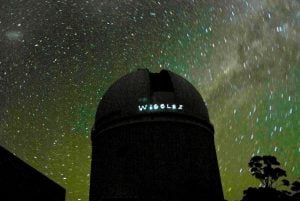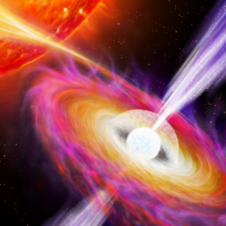ICRAR student scores top prize from Astronomical Society of Australia

The Astronomical Society of Australia (ASA) is awarding ex-ICRAR student Morag Scrimgeour, now Dr Morag Scrimgeour, a Data Scientist at Square in San Francisco, the 2015 Charlene Heisler Prize in recognition of her outstanding PhD thesis “Cosmology with Large-scale Structure and Galaxy Flows”.
Morag was based at the UWA node of ICRAR and part of “The Dark Universe” research theme of CAASTRO, the ARC Centre of Excellence for All-Sky Astrophysics. She completed her project in 2013 under the supervision of a very high-calibre team of Australian researchers, including ICRAR Science (UWA) Director and CAASTRO Deputy Director Prof Lister Staveley-Smith and 2015 Nancy Millis Medal winner and CAASTRO “The Dark Universe” theme leader Prof Tamara Davis (University of Queensland).
Morag also worked closely with 2013 Pawsey Medallist A/Prof Chris Blake (Swinburne University of Technology) and Nobel Laureate Prof Brian Schmidt (ANU) during her time at ICRAR. In 2012, she also received the bankmecu student scholarship by nomination from Brian Schmidt.
“The nominations received for the 2015 Charlene Heisler Prize were of an excellent standard and the judging panel were impressed by the high standard of Morag’s thesis and the impact her research is already having on the field.“ said Dr Tanya Hill of Museum Victoria, the ASA Prize Coordinator.

During her project, Morag was a member of the WiggleZ Dark Energy Survey. She used the AAOmega/2df spectrograph on the Anglo-Australian Telescope at Siding Spring Observatory to map distant galaxies. Our standard model of cosmology and Einstein’s theory of general relativity assume a homogenous distribution of matter at large scales and would break down if our data were to show clustering of stars and galaxies. Morag’s research provided evidence that matter in the Universe is, in fact, homogenously distributed, confirming our current models and theories. Video.
“The ability to identify interesting yet answerable questions is the hallmark of a great scientist, and that is exactly what Morag did with this project,” said Prof Davis.
She also calculated Galaxy Velocities – the push of Dark Energy against the gravitational pull of stars and Dark Matter – as tracers of matter distribution, using data from the 6dFGS survey. Video.
The prize will be awarded during this year’s scientific meeting of the ASA in July, hosted by ICRAR-Curtin.
“Morag is an exceptional scientist, and was a pleasure to supervise for her PhD. This is a well-deserved achievement,” concludes Prof Staveley-Smith.

